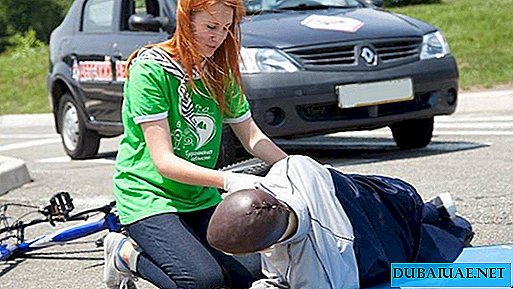The UAE authorities are preparing to adopt the first law on emergency assistance among Arab countries.

According to one of the UAE's top officials, the government has prepared a draft federal law that will allow any passerby to help victims of emergency situations without fear of liability.
According to Dr. Saleh Fares, head of the emergency department at the UAE Medical Association (EMA), lawmakers have finalized the law on the protection of non-emergency medical workers.
"We are developing this law and plan to finally adopt it in the first quarter of 2018," the official said. This bill was developed specifically for the UAE, its essence is that "against a person who has assisted another person in an emergency, it is impossible to file a criminal or civil lawsuit."
Currently, the UAE does not have such a law, as a result of which many citizens do not want to provide assistance in emergency situations.
"Today, about 70-90% of people are not ready to help because of the fear of undergoing various legal procedures and medical examinations," Dr. Saleh said. However, the adoption of this law will protect those who provide assistance to other people in an emergency, in the presence of a real threat to life and health.
"Our task is to ensure that people take the initiative and are not afraid to help other people who find themselves in an emergency, those people who really need help," Saleh added.
The official also noted that in saving a person’s life every minute of all the gold. "It is important to have time to help as early as possible, this can be of great importance and save a person’s life," he explained.
He also said that the bill provides for more lenient requirements for cardiopulmonary resuscitation in public places.
Like other regulations, the bill also provides for liability for evading reporting an emergency. "If you could help, but did not help, then you will be held responsible, our task is not to punish people, but to encourage them to help each other in emergency situations," Dr. Saleh added.
In accordance with the bill, assistance of this kind does not extend if there is a threat to the lives of other people when committing a crime, as well as after the arrival of official medical care services at the scene. After the adoption of the bill, each such case will be considered in private.
"All government departments agree on the need for this normative act, next month we will hold a series of meetings with the Ministry of Health in order to resolve all the necessary issues," Mr. Saleh said.
The humane side of the law:
- The UAE will be the first Arab country to adopt such a law.
- This law is based on the Law of the Good Samaritan.
- The law will provide significant assistance to all volunteers and health care providers.
- Well-intentioned carers will be protected by the letter of the law.
- The law will provide first aid and primary resuscitation in public places.
You are protected by law if you:
- Provide assistance, including emergency, in emergency situations, with good intentions.
- Report emergency situations.
- Only provide assistance until the ambulance arrives.
- Do not be at the crime scene.
Areas covered by law:
- The laws of the good Samaritan, as a rule, offer legal protection to people who provide reasonable assistance to those who, in their opinion, are injured, injured, in danger, or in a dysfunctional state for other reasons.
- Protection by law aims to reduce the fear and doubts of passers-by in providing assistance for fear of prosecution or civil action for causing unintentional injury or death through negligence.
- Similar laws exist in countries such as: Canada, United Kingdom, USA, Finland, Germany, Australia.
- Most of these laws do not apply to medical or ambulance personnel, but protects professional rescuers in situations where they acted as volunteers while not on duty.










